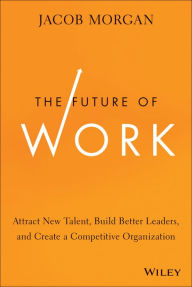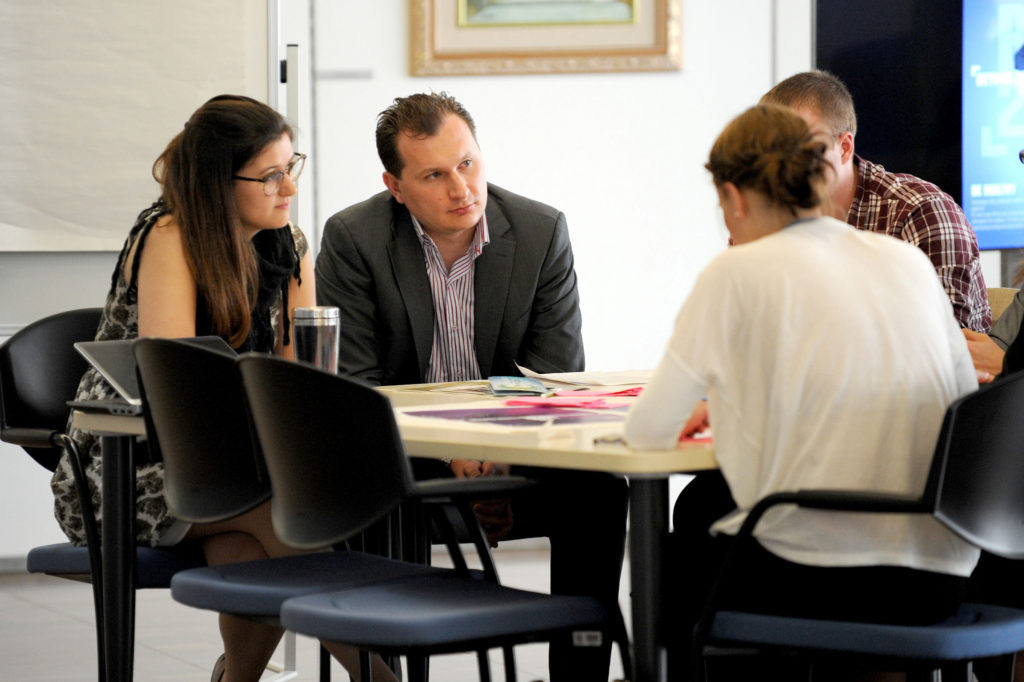Picture a workplace free of micromanagement—where responsibility in the hands of many and everyone is empowered to do their best. That’s the goal of holacracy. But how do you go from a traditional structure to this self-management model? Megan Leatherman, HR consultant and author of The Integrated Workplace, joins us to discuss the benefits and challenges of holacracy. We’ll talk through the thinking behind the movement, how it works, and how it can change your organization for the better.
Tell us what you think!
Brandon: Welcome to the HR for Small Business podcast, this is your host Brandon Laws. Thank you for joining us and thanks for the download today! Today I have a returning guest with me, it’s Megan Leatherman. She is a career coach and HR consultant in Portland. You can find her at www.meganleatherman.com. She also has an amazing blog, you need to go check it out, it’s www.theintegratedworkplace.com. I think I get, what, 2 to 3 alerts every week on new content, Megan? So you’re doing some awesome work and I think people should definitely subscribe to what you’re doing!
Megan: Thanks!
Brandon: The reason I had Megan come back on is she’s a volunteer on the Portland Human Resources Management Association, also known as PHRMA to those in the Portland area. It’s basically a subsidiary of the SHRM organization, the national organization for HR people. She’s on what’s called the Think Tank committee. I wanted to just give her a second to explain what the Think Tank is, because I believe it started as a book club and then you moved it over to what’s called a Think Tank. So, Megan, if you would just talk about that briefly.
 Megan: Yeah! So, my co-partner Nicole and I, we were leading a book club last year and we were really trying to create a space where people could discuss issues coming up in their work as HR professionals and we were finding that it just didn’t give us the freedom we wanted to talk about more innovative things. And I think asking people to read a book, in this day and age, can be a little much. So we wanted to create a different kind of atmosphere where we were really talking about stuff that wasn’t being discussed in other HR communities and it really feels like a facilitated dinner party where we just kind of open the floor and it’s a lot of open minded and innovative thinking professionals talking about things that are coming up in their work lives.
Megan: Yeah! So, my co-partner Nicole and I, we were leading a book club last year and we were really trying to create a space where people could discuss issues coming up in their work as HR professionals and we were finding that it just didn’t give us the freedom we wanted to talk about more innovative things. And I think asking people to read a book, in this day and age, can be a little much. So we wanted to create a different kind of atmosphere where we were really talking about stuff that wasn’t being discussed in other HR communities and it really feels like a facilitated dinner party where we just kind of open the floor and it’s a lot of open minded and innovative thinking professionals talking about things that are coming up in their work lives.Brandon: That’s awesome. And one of the recent topics, which actually is a segue into our topic for today, is the holacracy model. You guys talked about that at your last Think Tank. How did that come about? Did somebody bring up that topic? And then could you explain what a holacracy is?
Megan: Yeah, so I think the topic came about just as Nicole and I were talking about interesting things and the question we posed to the group was, Do we need managers and are they relevant anymore or for the future? And it was a pretty interesting conversation I thought, so it seemed like most people were really onboard with the kind of principles of holacracy and of treating people like adults and autonomy and giving people the freedom to really bring their entire selves to the workplace. But I left with a lot of questions, because while that seems true and everybody seemed to be on the same page about that, from my point of view, it doesn’t seem like the self-management model is really catching on very quickly.
Brandon: No, it doesn’t.
Megan: It seems like there’s a lot of resistance, so it seems like this kind of paradox. Personally, we all agree that this is valuable, but it’s not coming to life in our organizations. So that’s what you and I had chatted about and is really interesting to me and I’m excited to hear your thoughts about that too. And I can give a quick preview of holacracy, I mean, I’m not an expert.
 Brandon: Please do, I’m sure a lot of people don’t understand what it is or have even heard about it, because, to your point, it’s not really catching on a whole lot. And we’ll dive into that and maybe the reasons for it, but can you just explain what the holacracy model is and maybe where it came from originally?
Brandon: Please do, I’m sure a lot of people don’t understand what it is or have even heard about it, because, to your point, it’s not really catching on a whole lot. And we’ll dive into that and maybe the reasons for it, but can you just explain what the holacracy model is and maybe where it came from originally?Megan: Yeah! So, holacracy is a term that was captured by Brian Robertson and Tom Thomison who created a company called HolacracyOne back in 2007. It’s kind of an organizational development model that’s based on this idea of self-management and distributed power and people working in self-managing teams where there’s a kind of flow of information and processes.
Brandon: So, translation, there’s no hierarchy really anymore. It’s where you flatten an organization to where everybody sort of self-manages themselves. Is that right?
Megan: I think that’s the conception.
Brandon: And maybe that’s the issue!
Megan: Yeah, and that’s something we actually talked about at HR Think Tank. There was this great Harvard Business Review article that talked about some misconceptions of holacracy and one of them is that you don’t need any hierarchy. And so that may not actually work in theory, I think you do need some kind of structure. I think it’s just going to look a lot different than in our normal organizations today. But a concept that was fleshed out by Frederic Laloux in his book Reinventing Organizations, which I know you’ve heard of.
Brandon: I’ve read that book, yes.
Megan: It was this concept of the Teal Organization, which I think is a more expansive framework, I think holacracy has some baggage with it. But I really like his frame a lot more, and he notes that Teal Organizations are different in a couple of ways, one being that they focus on self-management but they also focus on wholeness, making sure that people are coming to work fully themselves and not behind this professional façade. And also on evolutionary purpose, the idea that an organization is a living ecosystem, that more stuff changes, and not a kind of machine, which he uses as a metaphor to talk about our current organizations today.
So holacracy or Teal Organizations, those, I think, are kind of interchangeable terms.
Brandon: Yeah, after reading Reinventing Organizations and they really explain both of them, for most organizations who aren’t even close to practicing anything near what those are, they’re basically the same. I treat them as they’re in the same category.
The next thing I wanted to ask you was who’s actually practicing this? Because I don’t hear about it a whole lot. We hear these crazy ideas come to light and we have a think tank to talk about could it work, could it not work. But who’s actually saying I’m all in, I’m doing it!
Megan: I think it’s still a pretty limiting forefront. Zappo’s is the most famous one I can think of, they’ve been very public.
Brandon: They went all in on it.
 Megan: Yeah, so they’re supposedly practicing holacracy using Brian Robertson’s model. But there are other organizations. In that book, Frederic Laloux cites a company that’s like 40,000 employees globally. I think the conception is that it’s only very small companies that can do this, but I think that’s debatable, I don’t think that’s necessarily true. And, you know, in Zappo’s’ implementation they’ve been pretty open about how it’s going. There was a recent podcast episode on The Future of Work with Jacob Morgan with a woman who helped implement holacracy there and one thing she noted was that after years of taking direction from managers or taking tasks given to them employees there have had a hard time transitioning to a self-managed entrepreneurial atmosphere. And that statement or that problem she referred to is kind of what got me thinking about how this work really has to start at a personal level. If we’re going to move to self-managing organizations, we have to self-manage ourselves. I think that is why this isn’t really catching on – we’re not talking about this enough at a personal level.
Megan: Yeah, so they’re supposedly practicing holacracy using Brian Robertson’s model. But there are other organizations. In that book, Frederic Laloux cites a company that’s like 40,000 employees globally. I think the conception is that it’s only very small companies that can do this, but I think that’s debatable, I don’t think that’s necessarily true. And, you know, in Zappo’s’ implementation they’ve been pretty open about how it’s going. There was a recent podcast episode on The Future of Work with Jacob Morgan with a woman who helped implement holacracy there and one thing she noted was that after years of taking direction from managers or taking tasks given to them employees there have had a hard time transitioning to a self-managed entrepreneurial atmosphere. And that statement or that problem she referred to is kind of what got me thinking about how this work really has to start at a personal level. If we’re going to move to self-managing organizations, we have to self-manage ourselves. I think that is why this isn’t really catching on – we’re not talking about this enough at a personal level.Brandon: Yeah, I agree. And with the implementation at Zappos, if I remember right, when they were really public about how it was going, they did expect a lot of people to just jump ship and I think they offered some sort of severance as part of it, maybe it was just a couple thousand dollars to say Hey, I’ll leave and self-select out. Did they see a lot more transitions than they’d thought or was it what they expected?
Megan: I think she said that about 14 or 15% of people left.
Brandon: Hm. That’s not very much.
Megan: I know. They also have a front end incentive where if after a couple of months or whatever people don’t think it’s a good fit they also offer cash to leave. So I think they are probably working with a pretty strong culture already so there wasn’t much incentive to leave. But yeah, I was surprised it was only 15%.
Brandon: Yeah, agreed. What’s interesting about how they recruit already from the very beginning, as you alluded to, is the fact that they already offer some sort of incentive to attract the type of person that they want. So by the time that they have their group of employees when they introduce something like this, they already have a core group of people who they know are a pretty good fit for Zappos. So when they introduce something like this, it’s probably not as big of a shock as if a manufacturing company who’s been set in their ways decided Hey, we’re going to do this self-management thing. I would expect 50% of the workforce to turnover, at least.
So I think it’s apples and oranges. Zappos is already kind of a leading edge company when it comes to the culture and how do they do work. Why do you think there is so much resistance to moving to this self-management model for most organizations?
 Megan: I think it’s really scary in a lot of different ways. If you are a manager or someone with some power and control in an organization it can be really scary to release some of that and let go of the oversight you are used to having. I think that oversight and control is kind of an illusion but it still feels very good and secure, so people don’t want to let go. The other thing is if you don’t have a team to oversee or if your job is not to manage others, you’re kind of faced with the other opportunity or the problem of stepping up and figuring out who you would be and what you would contribute if you don’t have these kinds of tasks at hand. I think the prospect of letting go probably really excites some of the listeners here and it probably terrifies others. And similarly if you are an employee and now your role is to simply do good work and you don’t have a job description to fit into, that means you’re held to be a lot more accountable to the results that you produce and to your teammates. I meet a lot of employees who are disheartened and exhausted but they’re kind of just mailing it in at the office each day. This model can be really liberating but it also requires us to step up in new ways that we might not be used to.
Megan: I think it’s really scary in a lot of different ways. If you are a manager or someone with some power and control in an organization it can be really scary to release some of that and let go of the oversight you are used to having. I think that oversight and control is kind of an illusion but it still feels very good and secure, so people don’t want to let go. The other thing is if you don’t have a team to oversee or if your job is not to manage others, you’re kind of faced with the other opportunity or the problem of stepping up and figuring out who you would be and what you would contribute if you don’t have these kinds of tasks at hand. I think the prospect of letting go probably really excites some of the listeners here and it probably terrifies others. And similarly if you are an employee and now your role is to simply do good work and you don’t have a job description to fit into, that means you’re held to be a lot more accountable to the results that you produce and to your teammates. I meet a lot of employees who are disheartened and exhausted but they’re kind of just mailing it in at the office each day. This model can be really liberating but it also requires us to step up in new ways that we might not be used to.Brandon: Yeah, and what’s interesting and the thing that strikes me about going to a model like this is that everybody has to be accountable. Everybody. It’s no longer I’m accountable to my manager. Now I’m accountable to a team of people. And for those who aren’t self-starters and just don’t work autonomously anyways, it might be a huge shift. I’m thinking, for me personally, my manager may recognize that I like to work autonomously so she’ll be hands-off on me while I produce the work and I get feedback as I need it and I’m accountable to her. For other people, maybe they want to be closely managed. And I think nowadays that’s up to a manager to recognize how people like to work. In this self-management model, everybody has to be accountable, to themselves and to their team. It’s such a huge shift that I just don’t know if it’s possible.
Megan: Well, you brought up something that I have questions about. You said if you’re not naturally a self-starter, or you’re not autonomous, I wonder, and I go back and forth, is that true? Are there truly people who are not self-starters or is it just that they’re in the wrong role?
Brandon: Yes, that’s a fantastic point. I think there’s truth to both but probably they’re just not in the right role. Because if they’re passionate about their work, they’re going to be self-starters. Right?
Megan: Yeah! Right!
Brandon: You think so?
Megan: I think so, but there’s this whole belief system happening in management that says that there are people who are not self-starters and you have to use either the carrot or the stick. I think that’s a misguided belief.
Brandon: I think so too.
Megan: And I think it’s scary for another reason, which is related. A lot of the organizations that are practicing these kinds of self-management techniques or creating practices around wholeness or work/life integration, which is something that is coming up more and more, they really make space for and expect their employees to show up fully themselves at work, not just with the professional scene that most of us are used to. That can feel really vulnerable on a personal level, right? To transition to a place where you can’t hide as much anymore.
 Brandon: Absolutely. You know, the thing that kind of sticks out to me about this is that when I saying a second ago that your manager is going to give you feedback and you’ll adjust based off of that, you may have a 1:1 every couple weeks or every month or something, and that’s the time you get your feedback as an employee, but in this self-management model I see a benefit to it in that you’re going to get feedback almost instantly because you have a team of people you’re sort of reporting to or held accountable by. And you might have a faster feedback loop. With this kind of organization, you could be a lot more nimble and shift really fast. What do you think of that?
Brandon: Absolutely. You know, the thing that kind of sticks out to me about this is that when I saying a second ago that your manager is going to give you feedback and you’ll adjust based off of that, you may have a 1:1 every couple weeks or every month or something, and that’s the time you get your feedback as an employee, but in this self-management model I see a benefit to it in that you’re going to get feedback almost instantly because you have a team of people you’re sort of reporting to or held accountable by. And you might have a faster feedback loop. With this kind of organization, you could be a lot more nimble and shift really fast. What do you think of that?Megan: I think that’s totally true. I think the extreme end of that where it could be less helpful is that there’s constant morphing and shifting and when we get anxious or nervous about change, we kind of create more chaos to feel busy and like we’re doing important work. I think it requires a balance of being really nimble and making sure the changes that you are creating are actually creating value.
Brandon: It’s funny, when we started the podcast you said that this could be like a little ecosystem that organically grows into something and I think that’s a great point. It could grow into something you don’t want it to by shifting and morphing. It’s not always a great thing, you want to stick to your core values and beliefs and grow the organization and attract the right type of people who are going to fall in line with your brand.
So when you talk about moving to a model like this, what are some of the assumptions that, for those on the opposing side of this, what are the things that would make people say, There’s no way this could work!
Megan: I think there are a lot of underlying assumptions that many of us aren’t aware of. I think managers are kind of stuck in or operating organizations that act more like machines than living things have a lot of these troubling assumptions.
And there’s no shame here at all, I think we’ve all been here and it’s our responsibility to choose how we want to move in the world. I don’t want anyone listening to feel ashamed or like they are a bad person just because they are operating under some of these beliefs.
That said, I think some of the troubling assumptions I have seen are things like, people are dishonest by default. So we have to track and verify their time, we have to track their expenses, we have to watch their work product closely. Beliefs like employees will steal if given the chance, so we lock our supply cabinets, we lock the petty cash drawer, we keep other valuable things hidden away. Or beliefs like employees won’t work unless they’re motivated either by a stick or a carrot and there are no self-starters here. Another one I see a lot, especially with my clients, is that expertise is dependent on someone’s status or fancy job title. That the knowledge we need, the data, the authority comes from people out there at the top.
So the question is, are those assumptions true? Are those things true or are those attitudes producing organizations in which you have dishonest and unmotivated and incompetent employees.
Brandon: You pose a great question. I’m sitting here listening to you rattle off some of those things, and I’m thinking Nah, it’s just an attitude thing – oh wait, no, maybe that’s a legitimate argument! I wonder with the hierarchy of fancy job titles as you just said, some people get motivated by that, and could that be a motivator killer if everybody has the same title and makes around the same money? There’s some downsides to doing something like that, I think.
 Megan: Yeah, it’s a total paradigm shift. But I think we have to get honest, it’s like that saying, if all you have is a hammer, then all you see is nails. If you believe that people are distrustful or they’re out to get you or they just want to be lazy and collect a paycheck, those are the kind of people you’re going to attract and the kind of environment you’re creating. I don’t really believe any amount of money or strategy can really change that. To me it’s a fundamental part of your operating system. Unless that changes, you’re going to keep producing the same kind of results.
Megan: Yeah, it’s a total paradigm shift. But I think we have to get honest, it’s like that saying, if all you have is a hammer, then all you see is nails. If you believe that people are distrustful or they’re out to get you or they just want to be lazy and collect a paycheck, those are the kind of people you’re going to attract and the kind of environment you’re creating. I don’t really believe any amount of money or strategy can really change that. To me it’s a fundamental part of your operating system. Unless that changes, you’re going to keep producing the same kind of results.It’s tough. I’ve totally seen both sides, but I’ve seen that when employees are given the benefit of the doubt, when power is distributed and some of that pressure is taken off with the idea of promotions and of what it means to be successful, I think people not only wake up to their own gifts and what they want to do in the world but I think they can create successful, world-changing organizations.
Brandon: Going into something like this, we all have these preconceived notions, like There’s no way it could work or It’s going to work. How do we untangle some of those beliefs that we might already have about something like this, like No it can’t work or Absolutely, we should do this tomorrow! What are some of those things that you’re thinking of that as you hear something like this come up?
Megan: I think it has to start with us as individuals. The first step of any change is to really just become aware of the problem. I would encourage folks to start taking note of how they feel in their organizations and the thoughts that go through their head throughout the day, like, for example, are you expected to be in the office by a certain time? Is that expectation self-prescribed or external? What would happen if you got to work at a time that worked for you? Is there a problem that keeps coming up on your team that you’re ignoring because it’s not within your job description? Start with the small things that are right around you and just play around with different ways of doing things. Notice your reaction to the rules, the system that you’re a part of. Notice how you feel listening to this podcast episode. Does the thought of self-managing your career scare you? Does it excite you? Start getting aware of where you fall on the spectrum of this concept. I think awareness is so important and I don’t think we have enough of it in our organizations and in our lives.
Brandon: I agree. I definitely think a model like this could bring out self-awareness, it’d have to for sure. Because you’d have to look at yourself at face value and say, Ok, where are my strengths, where are my weaknesses, how am I going to grow? How’s my team going to wrap around me and help me grow as well? It’s to everybody’s benefit that they do so.
When you look at yourself – I think you’re more of an entrepreneurial type, you like to do things on your own – but let’s say you’re in an organization that wants to shift to this kind of model. What do you see as some of the benefits to going to something like this, for you personally?
Megan: For me? I’ve been working by myself for about two years now, and it’s taken me that long to really get aware of and deconstruct some of these limiting beliefs about what it means to do good work. I think if I were part of an organization that moved in this direction, it would give me the freedom to apply my gifts in different ways and be creative and really be able to bring my entire self to the work, no matter what it was. I also think there’s huge growth potential when you’re part of a team that is headed in the right direction, you’re getting that support and that instant feedback like you mentioned. Working by yourself is great in a lot of ways but there is a real benefit to having groups of people who are like-minded and going through this process together. But I don’t think I’m that unique in wanting more independence and more autonomy and it didn’t really hit me until I was outside of a very traditional organization that it doesn’t make sense to me to be told when to get to work and how to work and wait for tasks to be delegated to me. It just does not make sense to me anymore and I meet a lot of people who feel the same way but are still in it.
 So I think awareness is key, and let me know if I’m getting off track, but I think there’s a second step to untangling some of this and that is to really reign in our need for external validation all the time and external data or motivation from outside of us. I recently taught a class on intuitive communication for women and something that came up is how much we all think we need outside input in order to validate what we already know to be true for us. I think that’s really true for HR professionals especially. HR is about people. It’s a very intuitive role, if you let it be. And yet it seems like the field is being pushed more and more toward that big data field which I think has a lot of value, but part of shifting to self-management is really relying more on your own personal judgment. And that can feel scary and threatening, but I think it’s a skill that we really, really need in today’s workplace.
So I think awareness is key, and let me know if I’m getting off track, but I think there’s a second step to untangling some of this and that is to really reign in our need for external validation all the time and external data or motivation from outside of us. I recently taught a class on intuitive communication for women and something that came up is how much we all think we need outside input in order to validate what we already know to be true for us. I think that’s really true for HR professionals especially. HR is about people. It’s a very intuitive role, if you let it be. And yet it seems like the field is being pushed more and more toward that big data field which I think has a lot of value, but part of shifting to self-management is really relying more on your own personal judgment. And that can feel scary and threatening, but I think it’s a skill that we really, really need in today’s workplace.Brandon: I agree. I want to jump in personally. I am in the corporate world and I do like it. Like you, however, I enjoy working on my own and I’m a self-starter. But I have a lot of those things where I work, at Xenium. If we were to shift to this kind of model, I see a few extra benefits. For one, I feel like I’m disconnected sometimes. There’s a small marketing team of two. So often I don’t feel like it’s a huge team. In a self-management organization you’re working with a large team, you’re getting the constant feedback, so I think there’s more learning opportunities; and I love to learn. I’m always reading books and talking about them on the podcast and bringing in guests so I can learn something, like yourself. Learning, I think, is a key thing. The other thing would be to have more self-management, more of it. Most people can thrive if they’re doing the right work under that sort of environment.
On the downside, however, one of the things that really draws me into the corporate world is the fact that there are things in front of you where you can grow. The job title thing, or more money. Those sorts of things, when laid out in front of you, it’s that carrot dangling there and it is a motivator sometimes. Now if you’re working in this flat organization I just don’t know if that motivation would be there other than being really passionate about the work you’re doing and doing it with a team. But I don’t think everything necessarily has to be together, sometimes we want those wins inside where we just scream from the top of our lungs, hey, I did an awesome job today! And you don’t have to share it with other people.
Megan: I think it’s going to look different in every organization. Because it’s made up of very different, unique people. One thing that comes up with these self-managing organizations is people set their own mile markers. I read about one organization where people set their own salary and it has to just be approved by their team. It’s very transparent. But if you feel like you’re ready for a promotion and deserve it then you make that case and oftentimes as long as it’s in the budget, it’s granted. What do you think about that?
Brandon: I think it’s crazy. You were talking about big data a little bit ago. We’re collecting data. Market data, salary data, employee engagement feedback – all that stuff is increasingly valuable when you come to these conversations of You know what, I want a raise and I want X amount of money. I think it all has to be pegged to the value of what you’re doing and what the market will bear. Now, if you’re in a self-management organization and you’re like, Yeah, I want $200,000 a year salary. Is it just going to be automatically approved? That seems crazy to me when you think about it in the grand scheme of things. I don’t think that could work, personally.
Megan: And I think that’s why you need that structure. That proposal would need to get reviewed by a committee of elected people and your team would have to know and approve it. I don’t think it would be like the wild west of getting raises whenever you wanted.
Brandon: But even then you talk about a committee, what if this particular person who asked for a raise has a special relationship with a couple people on the committee just because they’re friends or whatnot. To me it just seems like there could be more backdooring in that.
Megan: But you could argue that that happens anyway now.
Brandon: True! Absolutely.
Megan: There’s challenges like these in every organization.
 Brandon: We talked about how at the personal level why this could either be good or not good. Let’s bring it back to the business level – why would a business want to actually move to this? On the surface it seems like it’s really to squeeze as much volume and productivity out of people. Is that the ultimate reason, that it’s really impacting the bottom line? Or is it just to do something that they think is in the best interest of their people? What do you think?
Brandon: We talked about how at the personal level why this could either be good or not good. Let’s bring it back to the business level – why would a business want to actually move to this? On the surface it seems like it’s really to squeeze as much volume and productivity out of people. Is that the ultimate reason, that it’s really impacting the bottom line? Or is it just to do something that they think is in the best interest of their people? What do you think?Megan: I think Teal Organizations, people who are going to make up these places, see it as a value in and of itself. Yes it does affect the bottom line and hopefully the business stays healthy, and I think that there’s a strong case for the fact that it does when you move to this kind of model. But it’s also a much deeper kind of commitment than that. So I think the shift is from organizations that are focused on efficiency and the bottom line and can you be as productive and as proficient as possible. This is kind of a shift to what kind of ecosystem do we want to build, and yeah, profit is a part of that, but the journey in and of itself is valuable. The culture you’re creating, the power you’re sharing with people, is the goal in and of itself. And those are two very different paradigms.
Brandon: Yeah, I think if you moved to something like this, maybe this is just my personal opinion, but I don’t think it could be one thing or the other. It can’t be I’m going to switch to this because I want to increase my profit. I think it has to be, I’m going to increase my profit, but the way I’m going to do it is I’m going to do this Teal Organization where people are really happy in their jobs, they’re passionate about what they’re doing, and I’m going to attract the right kind of people. That’s what’s going to happen. My people are going to be empowered.
So you have this thing over here where my employees are super happy and they’re productive as a result, and then the consequence of that happening is increased profit. To me that seems like the better approach and the only reason you do it in the first place.
Megan: To be honest, I think companies are realizing more and more how much their talent or the people they’re recruiting want this and I think they’re trying to have one foot in each camp. I think that’s why we’re seeing all this work around employee engagement and empowerment and all this stuff. But I don’t think it’s paying the dividends that people expected and I think it’s because they’re doing it in order to be more profitable or in order to be more productive. Again, I think it’s that error in the operating system. You’re not going to get the results you want unless you fundamentally change your paradigm and the way you see people.
Brandon: You just said something that sparked something in me. I agree that a lot of what we’re doing in HR right now and what you see when you talk about culture and how to increase productivity, increase happiness and engagement and all that stuff. I think that our natural inclination is to offer some new benefit or have a party or do something fun. That’s what I think is a short term Band-Aid fix where people might be excited for two seconds and then back to business as usual.
I think maybe when you introduce something like this holacracy model, people are like, We’ve tried the fun stuff, we’ve tried offering a bunch of benefits, but we need to actually make a fundamental shift in how we’re doing our work. Do you think that’s why this has sort of been talked about, why it’s been created and why some are actually taking the leap and doing it?
Megan: Yeah, I think people know that it’s kind of time to stop playing around. I feel like HR and business is generally at a pretty big crossroads. Are you going to dive in and commit and trust that people are inherently good and able to do good work or are you going to cling to these semblances of control and oversight that really are not there? I think people are realizing that that’s kind of an illusion and that’s not working. But we have to decide if we’re ready to make that change or if we want to cling on.
 Brandon: So as we sum up this conversation we’ve had about the self-management organization, I wanted to ask you where you see this all going?
Brandon: So as we sum up this conversation we’ve had about the self-management organization, I wanted to ask you where you see this all going?Megan: Obviously I can only speak from my perspective. I work with and meet with a lot of people who are thinking this way already or are looking for that, so my caveat is that this is the world I’m surrounded by. In my perspective and in what I’m seeing I think this will become more and more interesting and popular to people as folks want to feel like they can be more whole at work and self-manage their own careers. I think it might seem kind of idealistic but I do think that this is where the world of work is headed.
Brandon: Yeah, I’m curious if it’ll go all the way there, I guess time will tell. Let’s bring this full circle, because we started out by talking about the HR Think Tank at PHRMA and how you guys discussed this. Tell me, what was the overall consensus? Did people think it could work, will it not work, what was the overall thought?
Megan: My takeaway was that people are definitely interested in this, especially at a personal level, just wanting more of their own self-management. Obviously lots of questions still, I think most folks knew that this was becoming more popular and that there’s more of a demand for this from people who are being recruited for organizations. But still a lot of questions about how it would be implemented and how do you do this transition in a good way. I think there were more questions than answers but my sense was that the general consensus was that people were curious about it. Some more than others.
Brandon: Makes sense. So I wanted to give you the final word, any final thoughts about this model? And then also tell people where they can find out more about what you’re doing and how they can reach out to you.
Megan: Final thoughts would just be, again, to encourage folks to start doing more of this at a personal level and to just stretch a little more and create rules that work for them in their career. I’m working primarily with individuals now doing career coaching and workshops with teams and working with organizations and members of the community. If people are interested in that they can learn more at my website which is www.meganleatherman.com. And it’s pretty clear on there how to reach me and all of that. I would love to hear from folks and I just want to thank you, again, for having me today.
Brandon: Absolutely, you’re welcome! And I encourage the listeners out there to definitely go check out your blog and subscribe. There’s a lot of good content on there. A lot of people in the HR industry just repost what SHRM’s doing or some of the legal firms’ compliance updates but you really put a lot of thought into your content and so I really appreciate that and I really enjoy reading it. So listeners, go subscribe! Megan, are you on Twitter or anything like that?
Megan: You know, I tried Twitter and I still don’t really get it. I’m on LinkedIn!
Brandon: Ok! Well she’s on LinkedIn if you want to connect or reach out that way. I’m on Twitter, @BrandonLaws if you want to reach out to me. We’ll talk to you soon!
